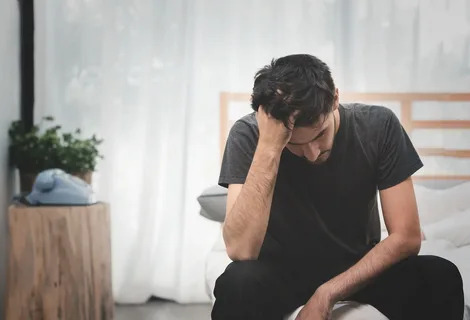
Anxiety and insomnia have become common problems in today’s fast-paced environment, impacting millions of people globally. Anxiety, a disorder defined by a continuous sense of worry, fear, or unease, frequently coexists with insomnia, which is characterized by difficulty sleeping or staying asleep. It takes a comprehensive strategy that takes into account both the psychological and physical facets of wellbeing to manage these disorders. Individuals can enhance their overall quality of life and effectively manage anxiety and insomnia by laying a solid basis for wellness. We will look at a number of methods in this post for laying the groundwork for wellbeing in order to control anxiety and insomnia.
Knowing About Sleep Disorders and Anxiety
One common sleep issue called insomnia can take many various forms, such as having trouble going asleep, waking up a lot during the night, or waking up too early and not being able to fall back asleep. When chronic insomnia lasts for three months or longer, and occurs at least three nights a week, it can have a major negative impact on general health and wellbeing.
Conversely, anxiety is a natural reaction to stress and in some circumstances, it can even be protective. On the other hand, excessive or persistent worry can cause problems with day-to-day functioning and sleep patterns. Anxiety is often accompanied by tense muscles, racing thoughts, and a difficulty relaxing, all of which make it harder to fall asleep.
The Connection Between Anxiety and Insomnia
Anxiety and insomnia frequently overlap and aggravate one another, resulting in a difficult cycle to escape. For instance, people who suffer from insomnia could get more anxious about not being able to go asleep, which could raise their arousal and cause more sleep disturbances. On the other hand, those who experience worry may find it difficult to unwind and quiet their brains, which makes it harder to get to sleep and stay asleep.
In addition, insomnia’s sleep deprivation can exacerbate anxiety symptoms by making people more irritable, less able to focus, and more sensitive to emotions. This feeds the vicious cycle of worry and insomnia, which has a number of detrimental effects on general wellbeing.
Creating a Basis for Wellbeing
Put Sleep Hygiene First
Create a Regular Sleep Schedule: To keep your body’s internal clock in check, go to bed and wake up at the same time every day, including on the weekends.
Establish a Calm Bedtime Schedule:
Create a relaxing nighttime ritual to let your body know when it’s time to relax. This could involve reading, having a warm bath, or engaging in relaxation exercises like meditation or deep breathing.
Establish a Cozy Sleep Environment:
Keep your bedroom cold, dark, and quiet to create a sleeping environment. Invest in pillows and a comfy mattress to promote sound sleep.
Restrict Stimulants:
Alcohol, nicotine, and caffeine should be avoided right before bed since they can make it difficult for you to fall asleep and stay asleep.
Control your anxiety and stress
Practice tension Management Techniques:
Take part in activities like mindfulness meditation, yoga, or tai chi that encourage relaxation and relieve tension.
The goal of cognitive-behavioral therapy, or CBT, is to alter unfavorable thought processes and behavior patterns that fuel anxiety and insomnia. It assists people in recognizing and disputing illogical ideas, creating coping mechanisms, and forming sound sleeping patterns.
Have Reasonable Expectations:
Refrain from overstressing yourself and come to terms with the fact that things won’t always go as planned. When things are tough, remember to be kind to yourself and practice self-compassion.
Continue Living a Healthful Lifestyle
Eat a Balanced Diet:
Give your body the healthy foods it needs to function at its best by giving it the energy and nutrients it requires. Eat light just before bed to avoid having a large dinner right before bed.
Exercise Frequently:
Engaging in regular physical activity can help lower anxiety and enhance the quality of sleep. On most days of the week, try to get in at least 30 minutes of moderate-intensity exercise.
Limit Screen Time:
To avoid disrupting your body’s natural sleep-wake cycle, limit the amount of time you spend using electronic devices like computers, tablets, and cellphones before bed. These gadgets generate blue light.
Develop Positive Relationships
Be Surrounded by Helpful People:
Establish and preserve bonds with family, friends, and other helpful people who provide you with support and encouragement throughout trying times.
If Needed, Seek Professional Assistance:
If self-help techniques don’t relieve your anxiety or insomnia, you might want to contact a medical or mental health expert. They can offer individualized treatment plans that target underlying problems and encourage sound sleep, such as medication or counseling.
Take Care of Yourself and Be Mindful
Make Self-Care a Priority:
Make time for enjoyable and calming pursuits, such as reading a book, taking a hobby, or spending time in nature.
Put mindfulness into practice:
Paying attention to your thoughts, feelings, and physical sensations without passing judgment will help you develop present-moment awareness. Deep breathing exercises, yoga, and meditation are examples of mindfulness techniques that can ease tension and encourage calm.
In summary
An all-encompassing approach is necessary to effectively address the complicated conditions of anxiety and insomnia. Through establishing a foundation for wellbeing that emphasizes stress management, healthy lifestyle practices, supportive relationships, and good sleep hygiene, people can effectively manage their anxiety and sleeplessness and enhance their quality of life in general. It is imperative to bear in mind that laying the groundwork for wellbeing is a journey that calls for commitment, tolerance, and self-compassion. People who are dedicated and persistent can develop routines and practices that support resilience against anxiety and insomnia as well as overall well-being.




